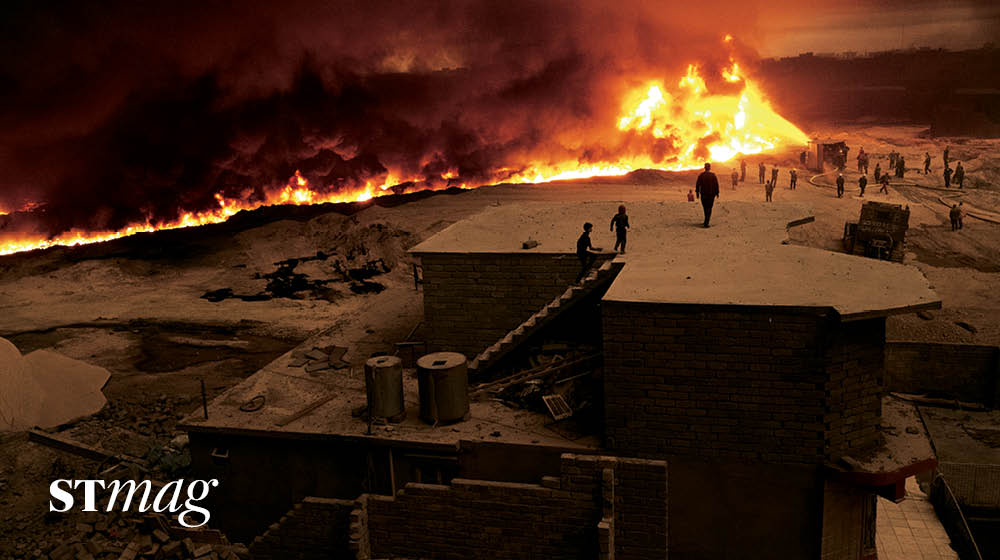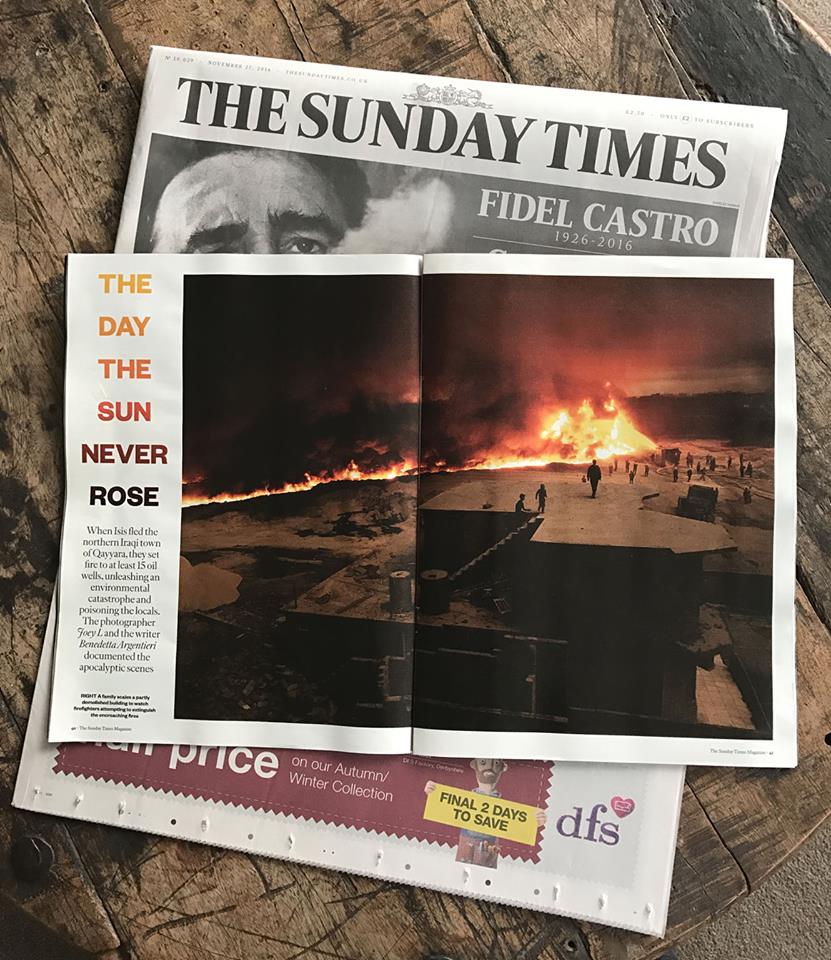The sun doesn’t always rise in Qayyara
Last month I travelled with photographer Joey L. in Iraq and Syria. In the first part of the journey we worked with Oxfam around Mosul area. It was an amazing reporting experience, especially in Qayyara where the burning oil wells, set on fire by ISIS while retreating. The scene is almost apocalyptic. Oxfam is doing an amazing job on the ground. I have seen first-hand.
The Sunday Times Magazine published Joey’s amazing pictures and my article with the title: “The Day the Sun Never Rose.” Below you will find the longer version of it.
QAYYARA (Iraq) – A haze of thick black smoke obscured the view of the sky. The only source of illumination was a wall of flames at least three-stories high. A constant humming drone came from boiling oil which looked like lava ready to spill out from a volcano. Suddenly a small pin prick of light revealed itself through the thick, noxious clouds- a reminder that it was actually the middle of the day.
On October 26, the town of Qayyara, Iraq, seemed to have become the real life interpretation of the Apocalypse. The Islamic State (ISIS) torched at least 15 oil wells before retreating from the area on August 25, perhaps reinforcing the wildest jihadi-dream that the end of the world was near.
In reality, the act created an environmental and health disaster for the communities in the surrounding area. Air pollution is so grave that thousands of people have been poisoned. Mosul is nearly 60 kilometers north, and the black sky is a serious impediment to the advance of the Iraqi Army and the Peshmerga. It also prevents coalition warplanes from targeting ISIS positions on the frontline.
Engineers and oil workers understand the urgency and the importance of drowning out the fire. Pressure to quickly resolve the situation came all the way from Baghdad. “We received the order from the Ministry of Oil, we need to extinguish the flames in one week,” said Basheer Murad, senior chief of the Nineveh Oil Fields. His optimistic view contradicted one of the other engineers on site, Ayad Aljaburi, who said the operation might take up to one month. In the past two months they were only able to douse six fiery wells.
To further complicate the situation, ISIS placed IEDs around some of the other wells. “American engineers inspected several sites and told us to be careful, we will have to wait before approaching them,” added Aljaburi. The current focus was a specific well on the outskirts of Qayyara, right in the middle of a residential neighborhood.
The latest operation began when a generator was brought on site. In the area there is no electricity– powerlines have been cut south of Mosul. As soon as firefighters started pumping water from nearby pools, the flames intensified and the smoke became thicker. As the inferno expanded, workers struggled to contain it by using dirt walls pushed by bulldozers. The temperature rose so high that the windshield of the vehicles had to be sprayed with water to stop them from melting. Firefighters operated from home-made metallic cubicles in an attempt to protect themselves.
More than 150 inhabitants gathered around the scene, worried about their nearby homes. The burning oil had already spilled over to at least twenty other houses, turning them into blackened hollow shells. The onlookers were covered with a thick layer of soot. Some protected their faces with worn-out cotton masks. Most didn’t seem to mind the toxic gas, as if they had grown used to the polluted air.
A group of at least 30 children were staring at the flames. In the days before, they had been playing around here, regardless of the danger and the warnings by the oil workers. But today was different, and everybody was eager to help even when their assistance was not needed.
Thousands of people have been treated in field hospitals. The symptoms range from severe headaches, breathing problems, chest pains, to skin rashes that look similar to eczema. The British NGO Oxfam, which is operating in the area expressed deep concerns about the health situation and the severe lack of services.
Officials tried to convince civilians to relocate somewhere else, at least for the time being. But most of them refused. “We are not going to leave our homes and live in camps,” said Mohammed Abdul Jabba. His house is the closest to the wells and the flames are just outside his windows. He had lived there under ISIS but fire will not move him.

